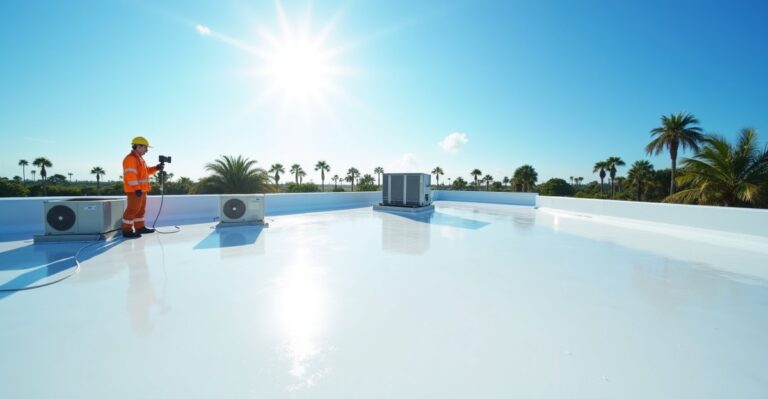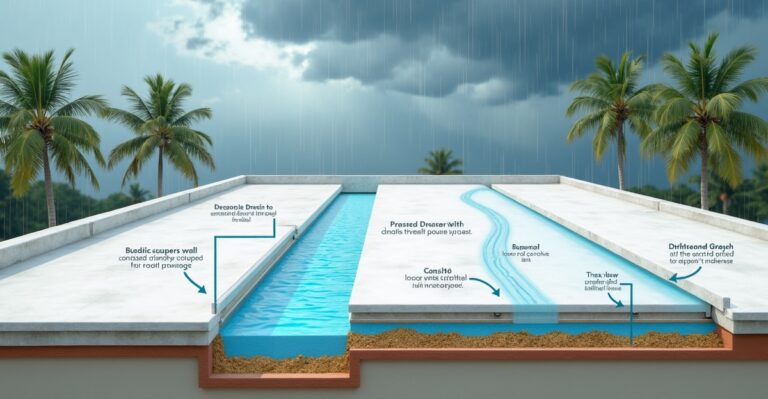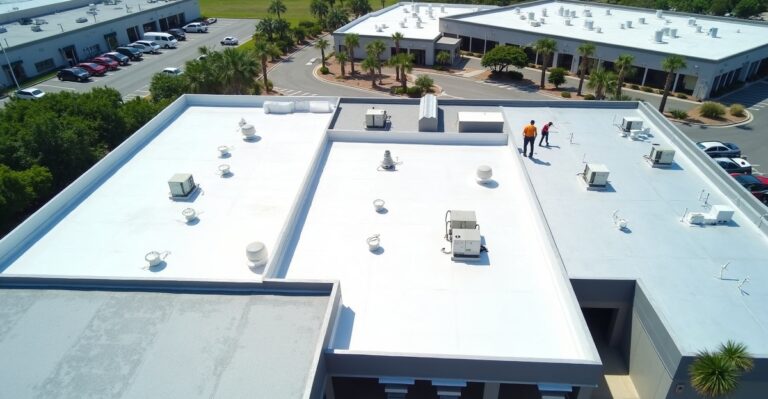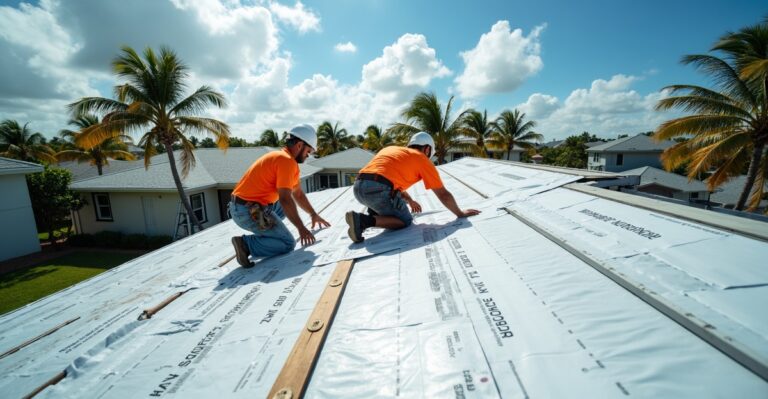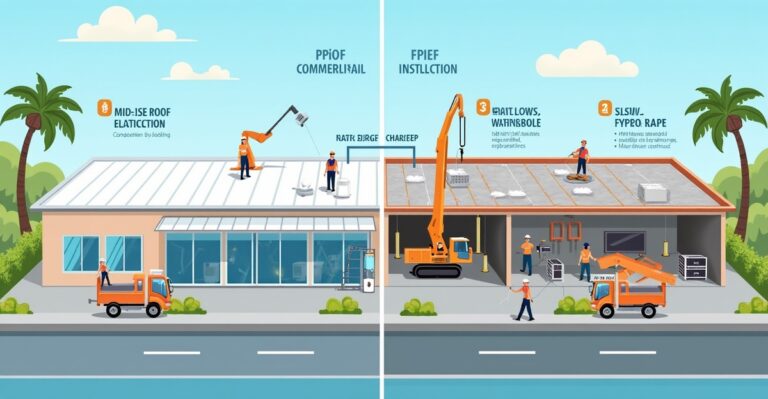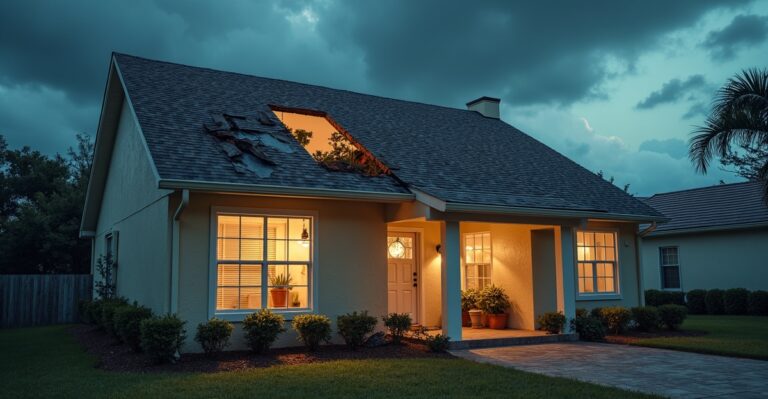Do Roof Coatings Really Extend Roof Life?
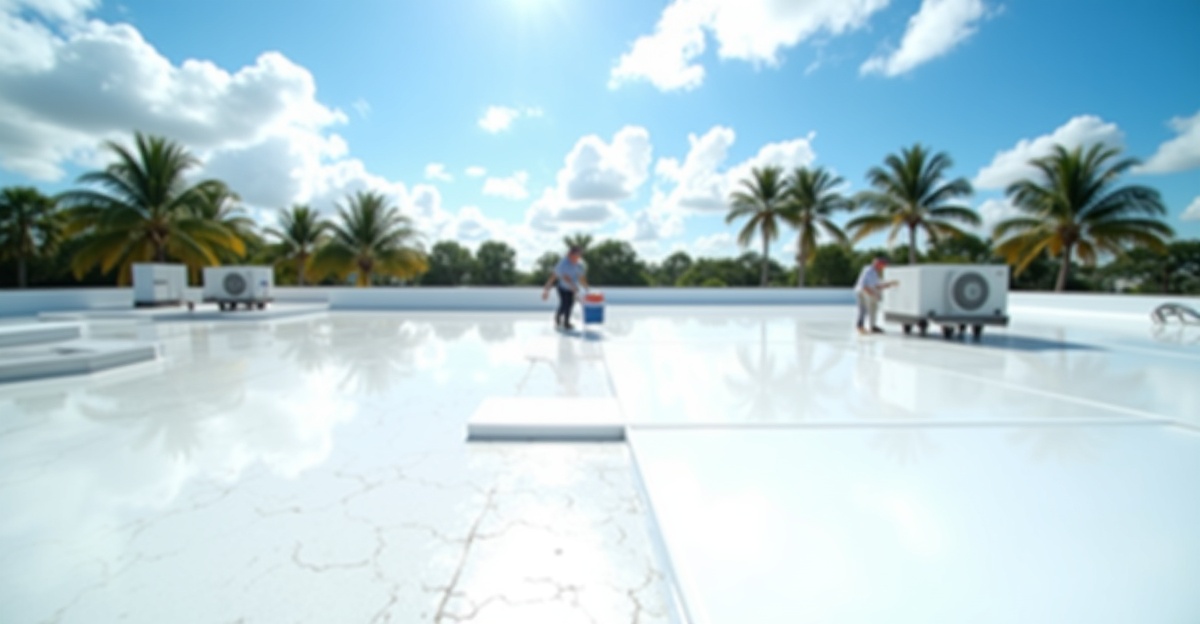
Applying a coating to a roof in good shape can add 5 to 15 years to its service life. It seals minor cracks, reflects heat, and helps block moisture—especially important in Florida’s intense weather. But it won’t solve major issues like rotting wood, structural sagging, or serious leaks.
Key Takeaways
- Coatings deliver the best results on roofs that remain structurally sound. They’re not a fix for serious damage or replacement needs.
- In Florida, coated roofs stay cooler, improving energy efficiency and better withstanding the impact of constant rain and high humidity.
- Elastomeric, silicone, and acrylic coatings each offer specific advantages depending on roof details like pitch, material, and exposure to sun and rain.
- Coating a roof can delay the need for full replacement, saving money and reducing disruption over time.
- For coatings to last, we need to prepare the surface correctly and follow up with routine care.
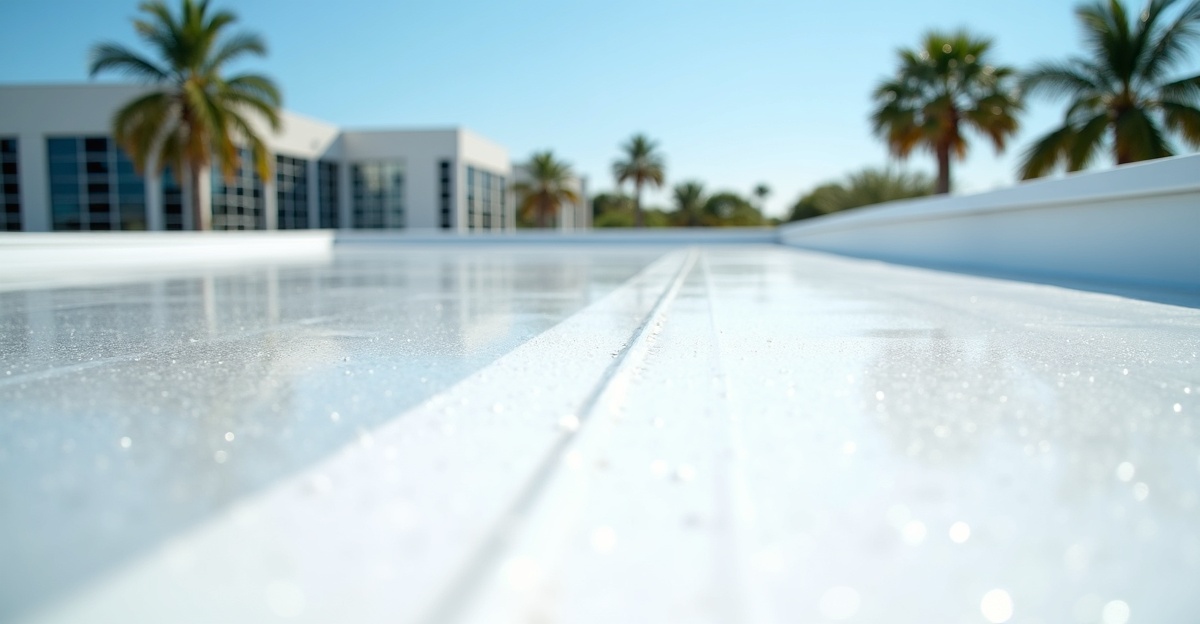
What Roof Coatings Actually Do (And Don’t Do)
A roof coating is a liquid-applied layer that hardens into a seamless membrane over your roof surface. Think of it like a weatherproof jacket — it adds a vital layer of protection, but it doesn’t rebuild what’s already broken. Commonly used on flat and low-slope roofs, coatings form a flexible barrier that guards against sun, rain, and minor surface wear.
Here in Florida, we rely heavily on three main types:
- Elastomeric roof coatings – Known for their stretch and flexibility, ideal for roofs that expand and contract with heat.
- Silicone coatings – Highly water-resistant, making them a great fit for combating our sudden downpours.
- Acrylic coatings – These provide strong UV protection and are often more budget-friendly.
Each type has strength in specific conditions, but all share a common goal: shielding your roof from environmental stress.
We often compare roof coatings to sunscreen. Just as sunscreen protects skin without healing old burns, coatings can’t fix a deeply damaged or aging roof. But when applied to a roof in decent shape, they dramatically boost its resilience.
What Roof Coatings Actually Do Well
When applied to the right type of roof in solid condition, coatings offer some real wins:
- Push back Florida heat. Reflective roof coatings in Florida play a big role in beating the sun. By bouncing sunlight away rather than absorbing it, these coatings reduce surface temperature, helping your building stay cooler year-round.
- Seal small cracks and slow down leaks. Coatings help prevent those minor issues from becoming costly repairs by blocking water intrusion before it spreads.
- Add 5 to 15 years of use. According to industry estimates, a properly installed roof coating can extend the life of a roof by five to fifteen years, depending on the material underneath and how well the overall structure holds up.
- Lower energy bills. Less heat in your attic or workspace means less strain on your air conditioning — leading to noticeable energy savings over time, especially in commercial buildings with large roof spans.
If you’re unsure whether you’re a good candidate for coating, we can inspect your roof and provide honest advice. Sometimes a strategic coating can buy valuable time before a bigger investment.
What Roof Coatings Don’t Do — And Where They Fall Short
We’ve seen some confusion out there, so let’s clear this part up.
Coatings are protective — not corrective. They won’t:
- Repair rotten decking or sagging trusses.
- Replace missing shingles or fix blown-off sections.
- Solve long-standing water damage.
If your roof already has major leaks, ponding water, or signs of structural decay, a coating won’t stop the underlying issues. In these cases, we usually recommend starting with a proper assessment. You can learn more about this in our guide to signs your roof needs replacement in Florida.
We often get asked whether repairs or replacement are the better path. The short answer depends on what we find during a roof checkup. Sometimes, coating isn’t even needed—basic repairs may do the trick. Take a look at this helpful article on whether a roof can be repaired instead of replaced.
Not Every Roof Is a Candidate
Applying a coating to a damaged or failing roof is like painting over cracks in a foundation. It might hide problems, but it won’t fix them. That’s why we always assess the condition of your existing surface before suggesting coating as a solution.
If your roof is in decent shape, coating can make a lot of sense — especially in Florida’s punishing climate. To learn more about how long each system lasts, check out this quick breakdown on how long roof coatings last in Florida.
We also install and maintain roof coatings for homes and businesses across the state. If your roof’s eligible, we’ll apply the right product with care so you get maximum value for years to come.
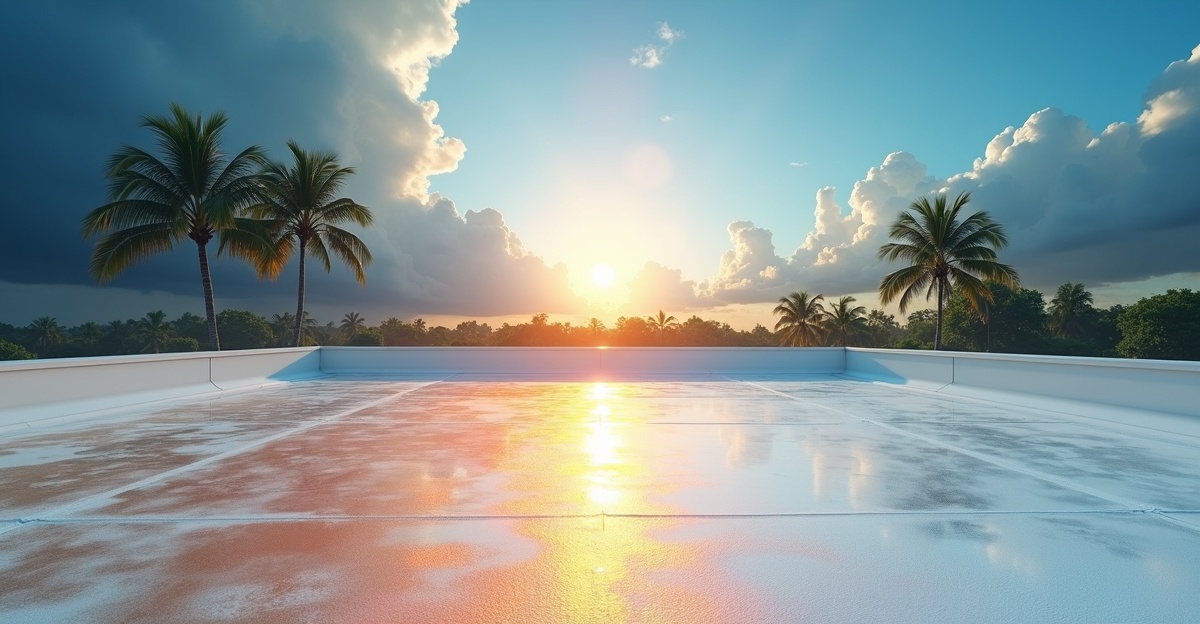
Florida Weather and Its Impact on Roof Coating Performance
Few places challenge roofing like Florida. The heat, humidity, and tropical storms test every inch of a roof, especially over time. That’s why understanding the climate impact on roof coating is key to maximizing performance and keeping your system protected longer.
Solar Exposure and Extreme Heat
Florida’s intense sun isn’t just uncomfortable—it’s relentless. UV radiation and prolonged surface temperatures above 140°F regularly wear down traditional roofing materials. That’s where cool roof coatings prove their value. Designed to reflect sunlight rather than absorb it, these coatings reduce heat transfer into the building.
Reflective systems can lower surface temperatures by up to 60°F, making them a smart choice for energy-efficient roofing in Florida. They help ease strain on AC systems and reduce overall energy bills, especially during peak summer. For both residential and commercial roofs, reflective coatings offer thermal protection that dry, cooler climates simply don’t require.
Rainfall, Humidity, and Biological Growth
Heavy rain and tropical storms are the norm here. For flat or low-slope systems, standing water—what we call ponding—is a frequent issue. Not all coatings are made to handle this. Cheaper or thinner products are more susceptible to roof coating damage when exposed to frequent saturation. Over time, this shortens the coating’s lifespan and may lead to early failure.
That’s why we recommend high-solids elastomeric coatings for properties prone to intense rain. These are flexible, adhere well to various surfaces, and resist damage from prolonged moisture exposure. For more detail on how long these solutions last in local conditions, we’ve laid out a full guide on Florida roof coating longevity.
Humidity also plays a different kind of role. In consistently damp environments, mildew and algae can form, especially on shaded roof sections. Certain coatings come with added fungal resistance—essential for maintaining surface integrity and appearance.
Here’s how Florida’s climate shapes the choice and performance of roof coatings:
- UV radiation levels call for high-reflectivity coatings to reduce heat load and extend roof life.
- High rainfall demands strong adhesion and ponding water resistance.
- Elevated humidity increases the risk of algae, making mold-resistant coatings beneficial.
- Tropical storms and wind can test the bond of the coating—premium systems fare better during hurricane season.
Unlike roofing projects in cooler, drier states, we approach every job knowing that Florida weather creates unique needs. That’s why working with experienced professionals familiar with regional performance trends helps ensure your system lasts as long as it should.
For commercial properties dealing with flat roofs, it’s worth exploring the benefits of professional roof coating services. It adds serious protection and can prevent early replacement.
Want to know the upfront investment too? Our breakdown of the cost of commercial roof coatings across Florida can help you budget confidently and avoid surprises.
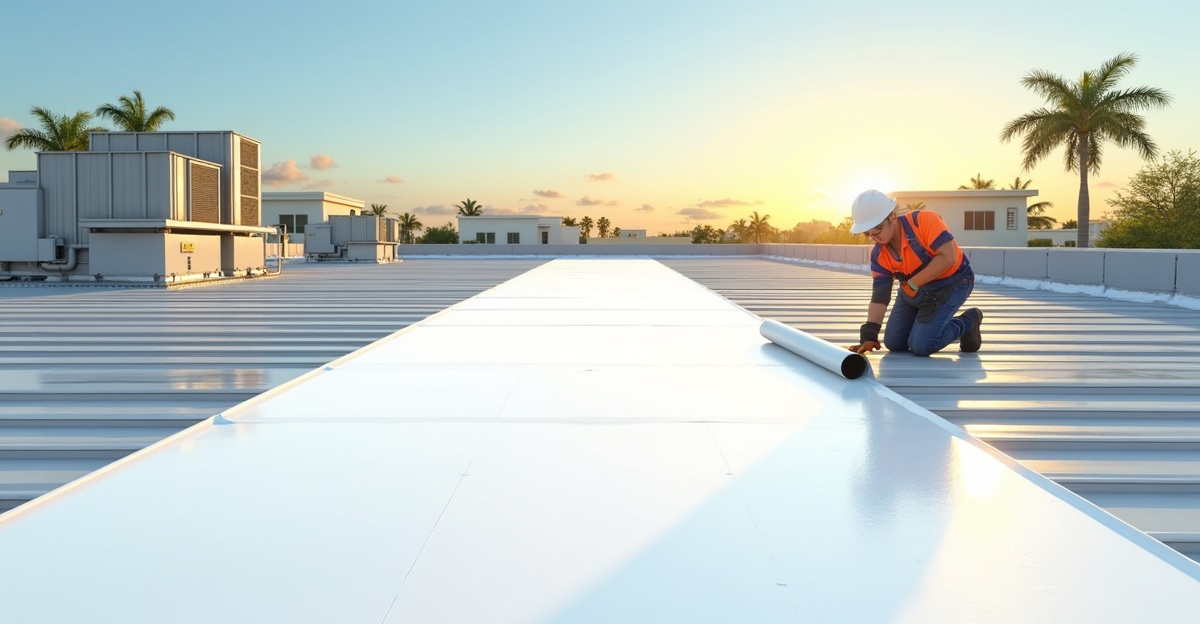
When Is a Roof Coating a Smart Investment?
A roof coating can be an affordable, efficient way to extend the life of an existing roof—if the conditions are right. It’s not a cure-all, but for many structures, especially aging commercial or metal roofs, it can buy valuable time and offer energy-saving benefits.
When Does a Roof Qualify for a Protective Coating?
We often recommend coating as a form of preventative roof maintenance when the structure still has good bones but is showing signs of age. It’s a smart investment if:
- The roof is structurally sound but showing wear. Around 10 to 20 years old is ideal.
- Small leaks are cropping up and need attention before they worsen.
- Energy costs are climbing, possibly due to heat absorption or worn reflective surfaces.
- The roof material is compatible—flat commercial roofs, metal roofs, and some asphalt shingles respond well to coatings.
- The budget can’t sustain the cost of a complete replacement but needs short- to mid-term protection.
You can think of coatings as adding a shield to what’s already there. They don’t fix rot or collapse, but they can help avoid those scenarios. For older shingle systems, a well-applied roof coating for shingles can help prevent granular loss and reduce thermal cracking.
Quick Checklist for Roof Coating Readiness
Before moving forward, it helps to run through a short list—and if you’re unsure, we’re happy to assess it for you. Here’s what we look for when considering coating vs replacing a roof:
- Roof Material/Type – Flat surfaces (like most commercial roofs), metal, and select asphalt shingle systems are coating-friendly.
- Age & Wear – Signs of aging with no major structural issues.
- Drainage – Gutters and downspouts are working correctly; no standing water.
- Repair History – Previous minor fixes are holding up, with no extensive recurring problems.
- Interior Water Damage – Minimal or none. If ceilings show signs of long-term moisture, replacement might be the safer choice.
If your roof passes these checks, a coating could be a solid, cost-saving option. It can delay costly replacement by several years. We go over the specifics with each client to make sure expectations are realistic. If major structural concerns or trapped moisture are present, a coating won’t solve the deeper issues. In those cases, we might recommend a full roof replacement or partial rebuild depending on the damage.
For flat commercial systems, we often apply elastomeric coatings after structural inspections. They’re designed to reflect heat, seal small cracks, and withstand Florida’s heavy rain cycles. Curious about longevity? This article on how long roof coatings last in Florida explains what to expect from different products across roof types.
A professional evaluation will give the clearest answer on whether coating is wise for your property—or if other work needs to come first. In some instances, roof repairs may be the needed first step before considering a coating at all.
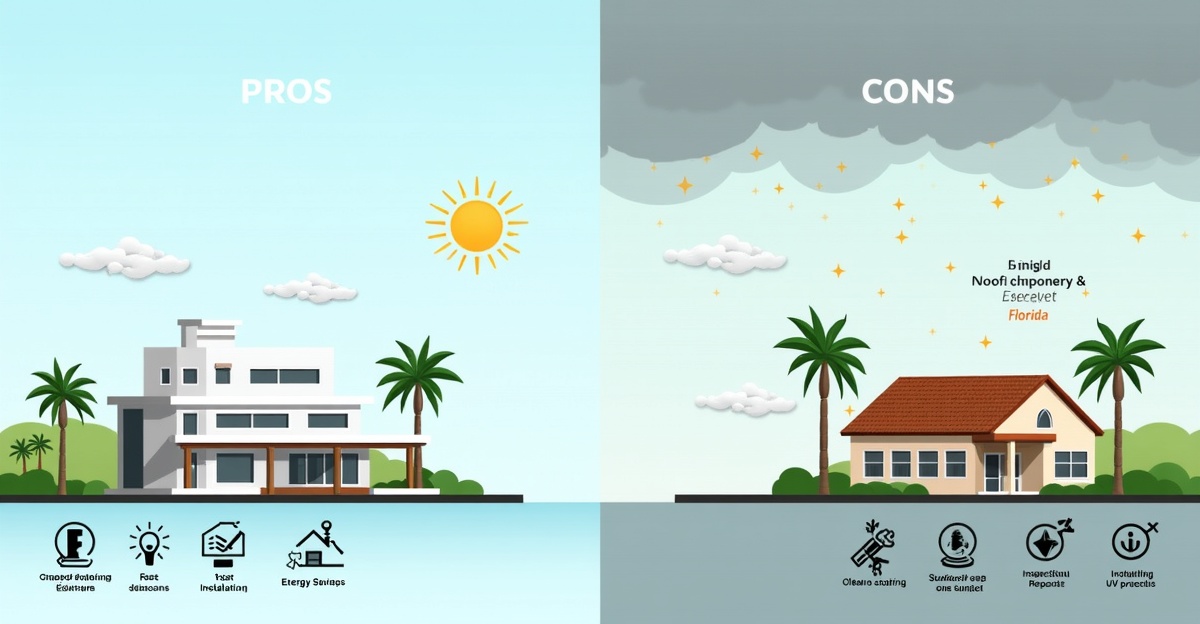
Pros and Cons of Roof Coating Solutions
Roof coatings can offer added protection and improve energy efficiency, but they’re not a one-size-fits-all solution. Whether we’re protecting a home or a commercial space, understanding the roof coating pros and cons helps us make a smart call.
Benefits of Roof Coatings in Florida
Roof coatings offer several strong advantages, especially under Florida’s harsh sun, seasonal storms, and high humidity. Here’s a clear look at the benefits of roof coatings for both homes and businesses:
- Lower cost vs. full replacement
Coating costs significantly less than a total roof replacement. It can be a smart alternative when the underlying structure is still in good shape. If you’re curious about the cost breakdown, check out this guide on
commercial roof coating cost in Florida. - Improved energy efficiency
Reflective coatings bounce back UV rays. That helps keep indoor spaces cooler and can reduce air conditioning costs—important savings during Florida’s sweltering summers. - Quick installation with minimal disruptions
Coating projects take less time than full replacements, which means fewer interruptions at home or in business operations. - Environmentally responsible
By extending the life of the current roof system, we reduce material waste. Less debris goes to landfills, and fewer raw materials are used. - Extends roof life when applied correctly
A well-prepared and properly applied extend roof life coating can add several years of performance. - Learn more about
how long roof coatings last in Florida and what affects longevity.
Considerations and Limitations
For all their perks, roof coatings aren’t suitable for every structure. Here are some things we need to weigh before going ahead:
- Not ideal for all roof types
Coatings generally work best on flat roofs or modern metal systems. Shingle roofs, especially ones showing major wear, usually aren’t good candidates. We recommend reviewing the condition and checking for
key signs of roof damage first. - Surface preparation is critical
If dirt, oils, or old materials get in the way, the coating may not bond properly. This prep work adds time and sometimes additional costs. - Lifespan varies depending on product and care
Most roof coating systems last between five and fifteen years. The actual
roof coating lifespan depends on the type of coating and how well it’s maintained. Re-coating may be required over time. - Won’t fix deeper structural issues
Coatings aren’t magic. If the roof deck is rotten or leaks are widespread, we may need to look into full
roof replacement options instead of a temporary patch. In some cases, quality
roof repairs could resolve the problem without starting from scratch.
When a Coating Makes Sense
Some situations are ideal for roof coatings. Residential homeowners with flat or metal roofs in decent condition can benefit from the heat reflection and moisture protection. For commercial properties, especially large flat roof buildings, coatings reduce operational downtime and extend usable roof life.
If the structure is sound and we’re looking for a cost-effective upgrade, coating gets the job done without tearing off layers. And when applied over a newer installation, coatings act as a protective barrier, delaying costly repairs down the line.
For business owners and homeowners interested in roof coating, we walk through roof age, type, and current condition before recommending the next step. If a home has older asphalt shingles nearing the end of their lifespan, this guide on
shingle roof lifespan in Florida offers solid direction.
In every case, we make recommendations that balance longevity, energy savings, and structural needs. Learn more about our
roof coating services or reach out through our
contact form to schedule a roof inspection.
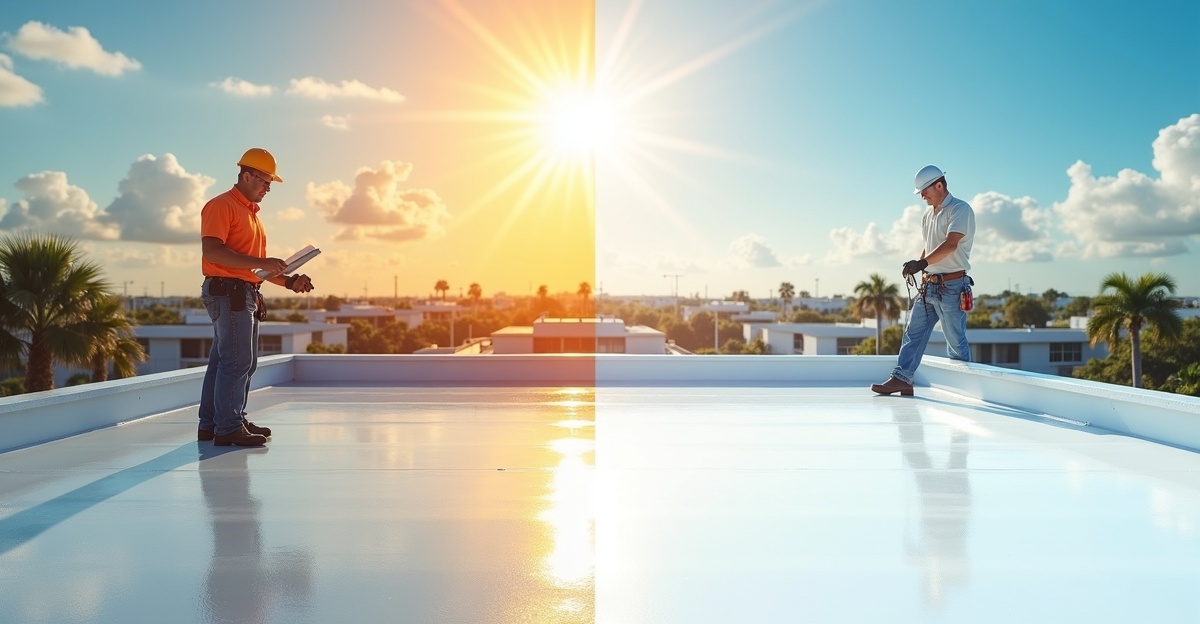
Questions to Ask Before Moving Forward with a Coating
Committing to a roof coating can be a wise form of preventative roof maintenance—but asking the right questions first helps protect your investment and avoid costly missteps. Before our team applies any coating, we evaluate each property to ensure the roof’s condition and materials align with the coating’s capabilities. Here are the key questions we encourage every property owner to consider:
Essential Questions for a Smarter Decision
To get the full benefit from a roof coating and avoid premature failure or wasted funds, make sure to ask these questions:
- Is my roof structurally sound enough for a coating?
Coatings work best on roofs that are still in good condition. If your roof has sagging areas, major leaks, or saturated insulation, a coating might only mask the issue rather than solve it. Schedule a professional roofing inspection first to confirm the structure is solid. Our licensed inspectors determine whether repair, coating, or full replacement is the best next step. - What type of coating is best for my roof material and pitch?
Different coatings—like silicone, acrylic, or polyurethane—each have unique pros and cons depending on roof type. Flat roofs often pair better with specific materials than steep-pitched shingle systems. We’ll help you choose what works best for your surface and local climate. You can learn more about compatible solutions on our
roof coating service page. - How long can I expect a coating to last in my area?
Coating performance varies depending on the product used and Florida’s intense UV exposure and humidity. Generally, coatings in the Sunshine State last around 10–20 years, with proper maintenance. For in-depth insight tailored to Florida homes or businesses, check out
how long roof coating lasts in Florida. - Will the product help with energy savings?
Reflective coatings help reduce rooftop heat absorption, making them a smart choice for lowering cooling bills. By bouncing away sunlight, silicone or elastomeric coatings can reduce indoor temperatures and ease strain on HVAC systems—especially important during those long Florida summers. - Are there maintenance steps or reapplication needs I should plan for?
Coatings don’t eliminate the need for maintenance. Most need inspections after heavy storms and routine cleanings to remove mildew or dirt build-up. Over time, roof coating wearing away can reduce protection, so a fresh coat may be needed to maintain effectiveness. Stay proactive and plan for occasional touch-ups. - How experienced is the contractor with coatings in Florida?
Working with certified and experienced
roof coating Florida contractors is critical. Florida’s climate is unique, with strong sun, hurricanes, and high rainfall. We’ve helped hundreds of Florida roofs get extended life with coatings where appropriate. You’ll get straightforward guidance, realistic expectations, and the right product for your conditions.
Professional tip: A roof coating won’t fix structural damage or extensive wear. Always get a licensed roofing inspection before committing to a coating. This ensures your roof qualifies and helps avoid wasting money on a short-lived solution. If we find your roof isn’t in shape for a coating, we’ll talk through repair or
full roof replacement options honestly—with no pressure.
For buildings with the right conditions, coatings serve as a powerful tool in preventative roof maintenance. When applied properly, they can delay the need for more extensive roof work. We’ll help determine if it’s the right fit and stand by our recommendations either way. If you’re unsure whether coating is your best route, this guide outlines
what roof coatings can and can’t do.
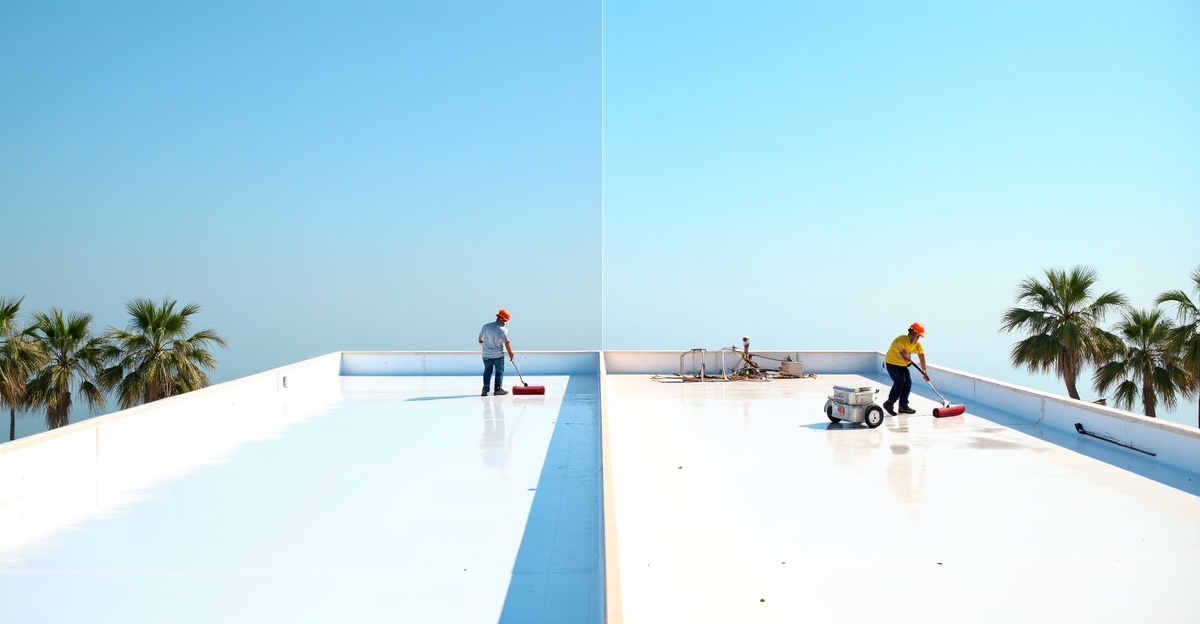
Comparing Roof Coating vs. Full Roof Replacement
When comparing roof coatings vs full replacement for businesses, it’s important to consider current roof condition, budget, and long-term goals. Commercial roof coatings offer a more affordable, less disruptive option—but they’re not the right choice for every situation. Here’s how both options stack up:
Roof Coating vs Replacing: Key Differences
Understanding cost, lifespan, and impact to operations can help in making the most informed decision:
| Factor | Roof Coating | Full Roof Replacement |
|---|---|---|
| Cost Range | $1.50–$4 per sq. ft. | $5–$12+ per sq. ft. |
| Lifespan / Durability | Extends current roof by 5–15 years | New roof lasts 20–30+ years |
| Installation Time | 1–3 days, minimal disruption | 5–10+ days, more invasive |
| Warranty Options | 5–15 years (varies by product) | Often 20+ years |
| Insurance & Code Compliance | Less likely covered by insurance | Often required after major damage |
Roof coatings are especially appealing for flat or low-slope structures and can be effective on metal, TPO, or modified bitumen roofs. They’re also commonly used on commercial buildings to boost protection and reflect heat—supporting energy-efficient roofing in Florida’s hot climate.
When Roof Coating Makes Sense
Coatings work well when the existing roof is in relatively stable condition. They act as a protective barrier, significantly cutting UV exposure and reducing surface temperatures.
Here are situations where applying a coating is a practical middle-ground:
- The roof has minor leaks or worn areas but no structural damage.
- You’re managing a budget or deferring a larger investment.
- You want to add energy efficiency and solar reflectivity.
- You need a fast solution with little disruption to business.
You can learn more about how these products work in our article on what a roof coating is and how it works.
But not every roof is a candidate. If there’s sagging, widespread saturation beneath the surface, or repeated leak issues, it’s wiser to consider a full replacement. A coating won’t overcome those deeper problems. Replacing the roof means starting fresh with materials that last decades. You can visit our roof replacement service page if that path feels more likely.
Still uncertain? We recommend scheduling an inspection and learning about the real-life roof coating lifespan based on building type and usage. Our guide on how long roof coatings last in Florida is a helpful place to begin.
Sometimes, it’s not about choosing the absolute cheapest or longest-lasting—you just need the right solution for now. Whether you’re considering commercial roof coatings as a stopgap or leaning toward a full build-out, our team is here to give honest feedback grounded in long-term value. Let’s figure out the most practical option together.

